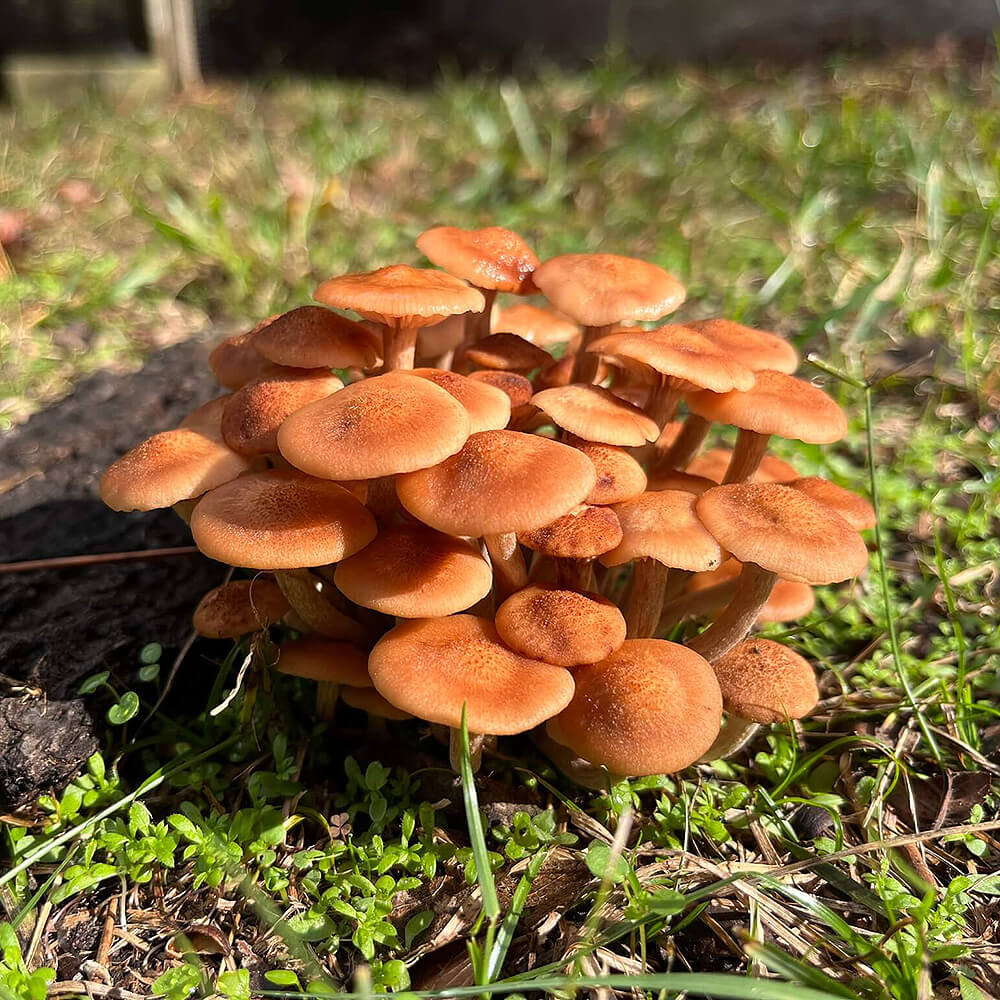Description
Ringless Honey Mushroom (Desarmillaria caespitosa) Liquid Culture
Bullet Points:
- Premium Liquid Culture: 12cc of high-quality, nutrient-rich liquid culture for cultivating Desarmillaria caespitosa.
- Aggressive Wood Decayer: A saprobic and parasitic species that rapidly colonizes dead hardwood.
- Sterile and Pure: Produced under sterile conditions to ensure contamination-free cultivation.
- Lack of a Ring: Unlike common honey mushrooms, this species is distinguished by its ringless stipe.
- User-Friendly: Ideal for researchers, mycologists, and conservationists studying wood-decaying fungi.
Taxonomic Classification:
- Kingdom: Fungi
- Division: Basidiomycota
- Class: Agaricomycetes
- Order: Agaricales
- Family: Physalacriaceae
- Genus: Desarmillaria
- Species: Desarmillaria caespitosa
What is the Ringless Honey Mushroom?
The Ringless Honey Mushroom (Desarmillaria caespitosa) is a widespread wood-decaying fungus known for its aggressive colonization of hardwood trees. Unlike its closely related Armillaria species, it lacks a ring on its stem, making it a distinctive species within the honey mushroom group.
This species is both saprobic and parasitic, meaning it can decompose dead wood but is also capable of infecting weakened trees, making it a subject of interest in forest ecology and tree health research.
Where Does Desarmillaria caespitosa Grow?
Ringless Honey Mushrooms are widely distributed across North America and Europe, commonly found on fallen logs, stumps, and live trees under stress. They typically fruit in large clusters from late summer through fall, often appearing after cooler temperatures and rainfall.
Because of their strong wood-degrading properties, they play a dual role in forest ecosystems—contributing to nutrient recycling while also being a concern for foresters and arborists due to their potential pathogenic effects on trees.
Unique Features and Research Potential
A Parasitic and Saprobic Species
Desarmillaria caespitosa has golden-brown caps with slightly darker scales, growing in dense, clumped formations. The lack of a ring on its stem helps differentiate it from other honey mushroom species.
Potential Applications in Mycology
Because of its ability to decompose wood rapidly, this species is studied for its enzymatic activity, interactions with tree hosts, and potential industrial applications in biodegradation. Some researchers are also exploring its ecological role in forest regeneration.
Sustainability and Conservation of Ringless Honey Mushroom
While Desarmillaria caespitosa is a common and resilient species, it is important to study its impact on tree health and its potential role in forest management strategies. Understanding its spread and growth patterns can aid in tree conservation efforts.
This 12cc liquid culture syringe provides a controlled method for studying and observing the growth habits and ecological interactions of this wood-decaying species.
Order Your Ringless Honey Mushroom Liquid Culture Today
Perfect for mycologists, forestry researchers, and fungal enthusiasts, this premium liquid culture syringe of Desarmillaria caespitosa provides an exciting opportunity to study a highly adaptive and ecologically significant species.
Ringless Honey Mushroom (Desarmillaria caespitosa)
Description
Ringless Honey Mushroom (Desarmillaria caespitosa) Liquid Culture
Bullet Points:
- Premium Liquid Culture: 12cc of high-quality, nutrient-rich liquid culture for cultivating Desarmillaria caespitosa.
- Aggressive Wood Decayer: A saprobic and parasitic species that rapidly colonizes dead hardwood.
- Sterile and Pure: Produced under sterile conditions to ensure contamination-free cultivation.
- Lack of a Ring: Unlike common honey mushrooms, this species is distinguished by its ringless stipe.
- User-Friendly: Ideal for researchers, mycologists, and conservationists studying wood-decaying fungi.
Taxonomic Classification:
- Kingdom: Fungi
- Division: Basidiomycota
- Class: Agaricomycetes
- Order: Agaricales
- Family: Physalacriaceae
- Genus: Desarmillaria
- Species: Desarmillaria caespitosa
What is the Ringless Honey Mushroom?
The Ringless Honey Mushroom (Desarmillaria caespitosa) is a widespread wood-decaying fungus known for its aggressive colonization of hardwood trees. Unlike its closely related Armillaria species, it lacks a ring on its stem, making it a distinctive species within the honey mushroom group.
This species is both saprobic and parasitic, meaning it can decompose dead wood but is also capable of infecting weakened trees, making it a subject of interest in forest ecology and tree health research.
Where Does Desarmillaria caespitosa Grow?
Ringless Honey Mushrooms are widely distributed across North America and Europe, commonly found on fallen logs, stumps, and live trees under stress. They typically fruit in large clusters from late summer through fall, often appearing after cooler temperatures and rainfall.
Because of their strong wood-degrading properties, they play a dual role in forest ecosystems—contributing to nutrient recycling while also being a concern for foresters and arborists due to their potential pathogenic effects on trees.
Unique Features and Research Potential
A Parasitic and Saprobic Species
Desarmillaria caespitosa has golden-brown caps with slightly darker scales, growing in dense, clumped formations. The lack of a ring on its stem helps differentiate it from other honey mushroom species.
Potential Applications in Mycology
Because of its ability to decompose wood rapidly, this species is studied for its enzymatic activity, interactions with tree hosts, and potential industrial applications in biodegradation. Some researchers are also exploring its ecological role in forest regeneration.
Sustainability and Conservation of Ringless Honey Mushroom
While Desarmillaria caespitosa is a common and resilient species, it is important to study its impact on tree health and its potential role in forest management strategies. Understanding its spread and growth patterns can aid in tree conservation efforts.
This 12cc liquid culture syringe provides a controlled method for studying and observing the growth habits and ecological interactions of this wood-decaying species.
Order Your Ringless Honey Mushroom Liquid Culture Today
Perfect for mycologists, forestry researchers, and fungal enthusiasts, this premium liquid culture syringe of Desarmillaria caespitosa provides an exciting opportunity to study a highly adaptive and ecologically significant species.



